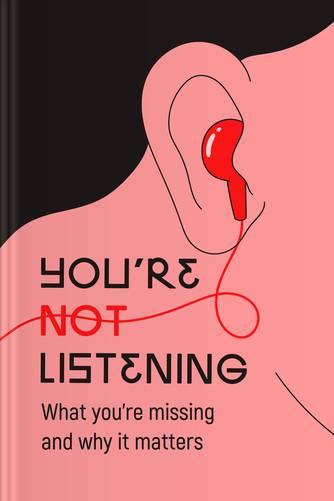

Kate murphy you re not listening full#
For a full comparison of Standard and Premium Digital, click here.Ĭhange the plan you will roll onto at any time during your trial by visiting the “Settings & Account” section. Premium Digital includes access to our premier business column, Lex, as well as 15 curated newsletters covering key business themes with original, in-depth reporting. Standard Digital includes access to a wealth of global news, analysis and expert opinion.

The list is endless.During your trial you will have complete digital access to FT.com with everything in both of our Standard Digital and Premium Digital packages. Murphy points out there are so many things we can do with a smartphone today. It's also made me think again about all the possible harm from staring at screens. What do you think of these ideas from 'You're Not Listening'? The book has led me to reconsider some of my communication habits. A stronger sense of safety in conversations creates deeper connections. When possible, provide support responses that give space and show you recognise what the speaker is experiencing. It's a way to change topics, avoid uncomfortable emotions or simply to fix something quickly. The shift response puts the listener's comfort ahead of the speaker's. Shift responses disregard or attempt to fix something quickly instead of listening and acknowledging. A shift response changes the direction of the conversation. A support response encourages the speaker. Murphy introduces the idea of support and shift responses. Great conversationalists create an environment for people to feel comfortable to speak openly. They become experts at reading non-verbal cues to get to the subtext (what is behind the words being said). Good listeners know there are benefits to paying close attention to themselves and others. And if you don’t handle it with care, the person will start to edit future conversations with you, knowing, “I can’t be real with this person.”

Whether someone is confessing a misdeed, proposing an idea, sharing a dream, revealing an anxiety, or recalling a significant event-that person is giving up a piece of him or herself. “Anyone who has shared something personal and received a thoughtless or uncomprehending response knows how it makes your soul want to crawl back in its hiding place. Are there areas in your life that you are not willing to explore or deal with honestly? That will limit your ability to connect with others at deeper levels. The ability to truly connect with others is based on how much you connect with yourself. Be self-awareĪnother key aspect of being a good conversationalist is being self-aware.

They recognise the value of taking in different viewpoints to find genuine solutions. It is the result of focus and experience. Good managers, for example, are good listeners. “The truth is, we only become secure in our convictions by allowing them to be challenged.” This is an approach that is not based on finding quick and easy answers. Develop frameworks that allow for the inherent contradictions of being human. What led to those decisions?īeing able to take on board opposing views enriches your experience. Seek to understand why a person supports the beliefs they have. It's not a matter of seeking out opposing opinions to disagree, or to convince. It takes time and patience to stay present as people share. They work to develop habits that support their goals. If someone is dull or uninteresting, it’s on you.” “The most valuable lesson I’ve learned as a journalist is that everybody is interesting if you ask the right questions. Murphy notes that people can tell when you are being genuine, so don't just reserve it for the VIPs. Try to dedicate more of your most valuable asset, your focus and attention, to the living beings around you. Cultivate CuriosityĬhoose to be curious about people. Here are some tips from the book to build your communication skills. There are some ideas for everyone who wants to build stronger bonds with people. The book was not created for English language learners specifically. It is a call to take a serious look at what modern culture has done to listening habits in general. It also limits our capacity to create deeper levels of meaning in our lives. It affects our ability to build stronger social connections and develop leadership skills. With that, we also lose many opportunities. She suggests the practice of taking the time to get to know people is also being lost. As a journalist, Murphy questions the impact of losing the art of listening. 'You're Not Listening What you're missing and why it matters' is a book about the value of being a good listener.


 0 kommentar(er)
0 kommentar(er)
